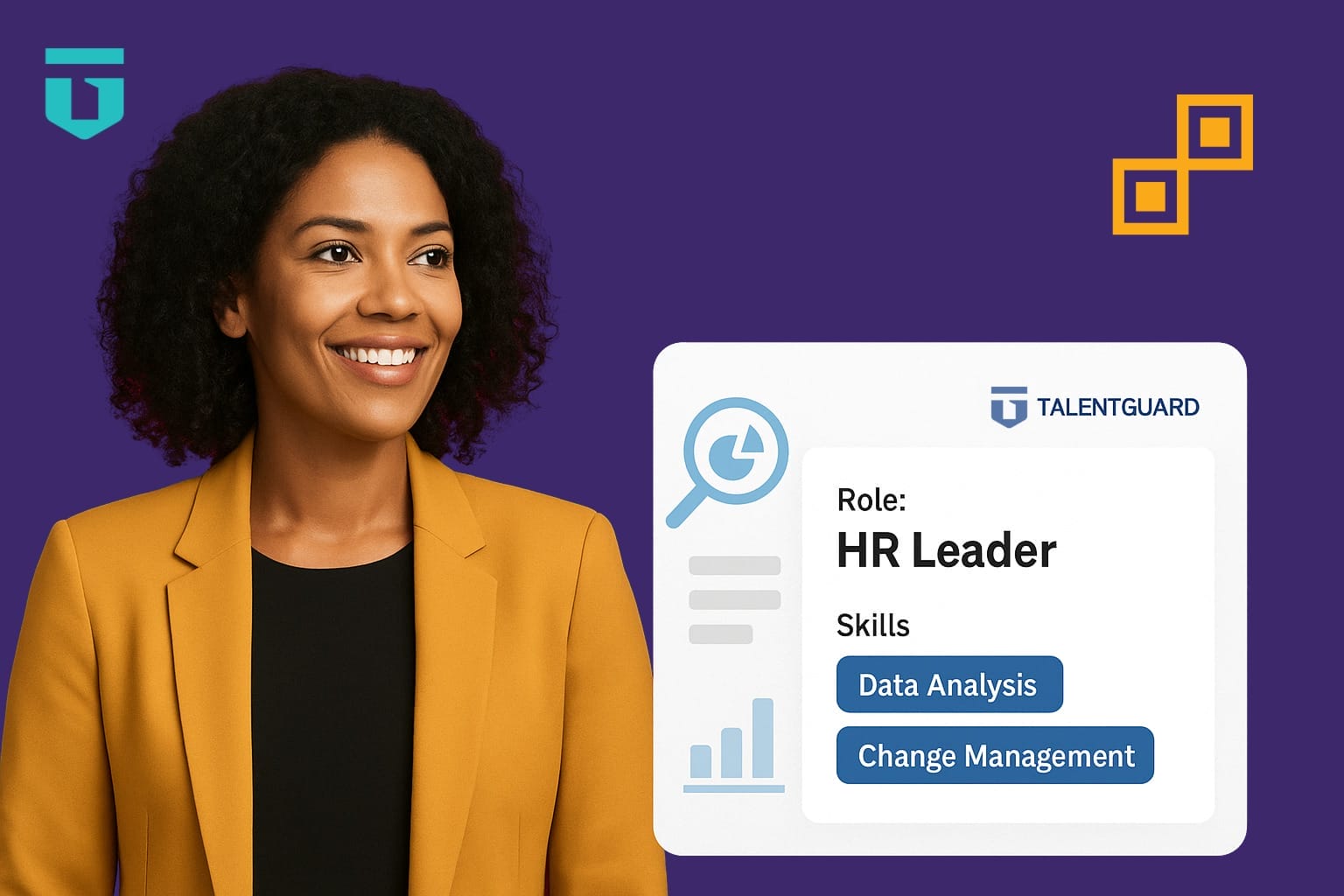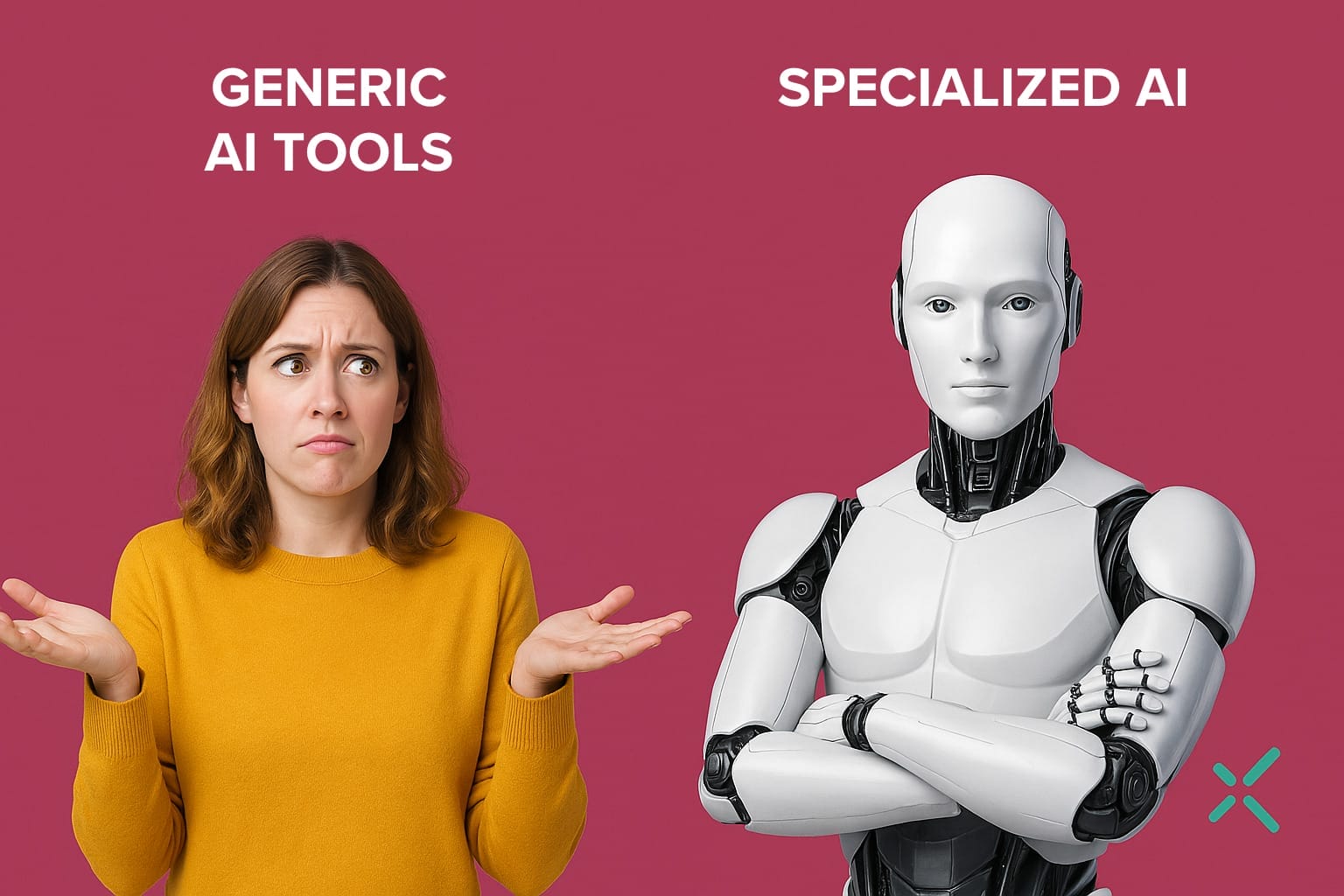HR in the AI Era: Essential Skills for Leaders

Discover HR in the AI era and how leaders need to navigate the future of talent management with confidence and clarity. AI isn’t on the horizon anymore – it’s already reshaping how we work and evolving fast. HR Leaders now face the pressing reality of rapidly integrating AI-driven technologies into their talent management strategies.
Even though AI holds enormous promise, many HR teams still feel hesitant. It’s not that they’re unwilling – it’s just unclear what steps to take or where to start. In this article, we’ll break down the essential know-how and practical skills HR professionals need to make AI work for them, sidestep common mistakes, and guide their organizations toward long-term success.
Demystifying AI for HR
Many HR professionals find themselves at two extremes regarding AI adoption:
- Overly cautious due to perceived complexity or;
- Overly enthusiastic without understanding AI’s limitations.
For instance, general-purpose AI tools like ChatGPT can seem highly capable initially but often fall short when explicitly applied to HR scenarios like role definitions, skills alignment, or bias-free talent assessments. Here is a typical scenario we see. When HR buyers come our way they tell us they recently tried building out a full skills and job taxonomy in ChatGPT—just to see what it’s like without specialized tools.
Creating a few skills? Easy.
Creating dozens or hundreds with consistency, quality, behavioral indicators, and alignment across roles? Brutal.
That’s the reality many HR leaders are waking up to. General-purpose AI tools aren’t enough—and missteps are costly:
Misunderstandings about AI lead to bad strategy.
Inconsistent data causes inaccurate talent assessments.
Competitors using specialized AI for HR are already making smarter decisions—faster.
The key is finding balance. Instead of seeing AI as something that will take over, forward-thinking HR leaders view it as a co-pilot—great at handling repetitive work and supporting smarter decisions, not replacing people.
Essential AI Skills for HR Professionals
1. Data Literacy and Analytical Skills
AI runs on data, so understanding how to work with it is necessary for today’s HR teams. Leaders don’t need to be data scientists, but they do need to know how to read the numbers, spot what matters, and turn insights into action.
For example, digging into workforce analytics can reveal patterns like rising turnover or gaps in key skills—giving HR a chance to respond before those issues escalate.
2. Get Clear on What AI Can—and Can’t—Do
HR professionals don’t need to dive into code or become tech experts, but they do need a solid grasp of what AI is good at and where it falls short. Check out our HR AI Buyer’s Guide Series for more information.
While general AI tools can handle various tasks, they often miss the mark in complex HR scenarios. That’s where specialized HR-focused AI delivers more accurate and relevant insights.
That said, AI isn’t flawless. Sometimes, it can sound sure of itself even when it’s completely off base—a phenomenon often called “hallucination.” Bias can also creep in, especially if the data behind the system isn’t balanced. HR leaders must still stay hands-on: checking outputs, asking the right questions, and stepping in when something doesn’t look or feel right.
3. Leading Through Change with Confidence
Bringing AI into talent management isn’t just about new tools—it’s about helping people adapt. HR leaders play a crucial role in guiding their teams through this shift. That means clearly explaining the benefits, listening to concerns, and helping employees adjust as roles and processes evolve.
Strong change leadership builds trust, keeps teams engaged, and smooths the transition for everyone involved.
4. Staying Ahead of the Ethical and Legal Curve
As AI continues to evolve, so do the rules around how it’s used. HR leaders need to stay on top of emerging regulations—like the EU AI Act—to ensure their use of AI is fair, transparent, and legally sound.
When HR stays informed, it becomes easier to spot red flags early and bring in AI tools in a way that feels safe and fair for everyone.
5. Keeping Human Judgment Front and Center
AI can handle a lot of the busy work, but it shouldn’t replace human insight—especially when decisions impact people’s careers. HR leaders must stay sharp, ask the right questions, and know when to step in.
Whether you’re making a hiring decision, considering a promotion, or navigating a sensitive employee matter, good judgment still matters most. Critical thinking helps ensure that AI is used as a support—not a substitute—for thoughtful, human-centered decisions.
Using the Right Tools for the Job
Generic AI tools can be helpful, but they often fall short when applied to the complex world of HR. They may miss important context or introduce bias when tackling tasks like role matching or talent assessments.
In contrast, AI solutions specifically for HR can handle these challenges. They draw on trusted frameworks—like IBM’s Talent Frameworks—and use fine-tuned algorithms to deliver insights that are accurate, relevant, and aligned with strategic goals.
Specialized AI helps HR leaders:
- Create precise role definitions and skill profiles aligned with organizational needs.
- Spot gaps in skills early and uncover where growth is needed.
- Offer tailored learning paths and career development suggestions.
- Support fair, accurate assessments and help map out internal mobility opportunities.
Practical Steps to Start Leveraging AI
If your HR team is gearing up to start—or scale—its use of AI, here are a few smart first steps to build a strong foundation:
- Conduct an AI readiness assessment to evaluate your current technology, processes, and data infrastructure.
- Invest in targeted training and education programs to build foundational AI knowledge among your HR team.
- Start with small, controlled pilots to build confidence, demonstrate value, and gradually scale your AI adoption.
- Establish clear guidelines and governance frameworks to ensure responsible and transparent AI usage.
- Continuously measure outcomes and refine your AI strategy using data-driven feedback loops to optimize processes.
Human-AI Partnership: The Future of HR
The best HR teams understand that AI isn’t here to replace people—it’s here to support them. While machines are great at crunching numbers, spotting patterns, and handling repetitive tasks, human judgment, creativity, and connection drive real impact.
This blend of data-driven insight and human intuition is shaping the future of talent management. By building the right skills, HR leaders can make the most of AI and confidently guide their organizations into the next chapter—with both people and technology working in sync.
Leading the Way with Confidence – HR in the AI Era
HR professionals stand today: either embrace AI strategically or risk falling behind. Building a solid foundation in data literacy, ethical awareness, critical thinking, change management, and specialized AI understanding equips HR teams to lead this new era confidently.
AI is already reshaping workplaces and redefining talent management. The organizations and HR leaders who proactively acquire these essential skills and leverage specialized AI solutions will survive and thrive in the AI era.
Ready to enhance your talent management? Request a demo today to discover how specialized AI solutions can drive accurate, unbiased, and strategic talent management outcomes. Let’s bring HR in the AI era with keen planning.
See a preview of TalentGuard’s platform
Why General-Purpose AI Tools Fall Short in HR
Today’s HR teams face unprecedented pressure to integrate General-Purpose AI-driven tools to streamline talent management. On the surface, general-purpose AI tools like ChatGPT appear convenient – easy to access, intuitive, and seemingly helpful. However, HR requires unique demands, and these tools lack the specialized understanding that talent management needs. That’s where purpose-built AI for talent […]
AI-Powered Career Pathing is the Future
The traditional approach to career development—characterized by predictable, linear progressions up a corporate ladder—is becoming increasingly obsolete. For HR professionals new to modern talent management, understanding this shift is crucial to building resilient organizations equipped for future challenges. Today’s progressive HR executives know this, but many still struggle to transition toward more dynamic models. AI-Powered […]
From Skills Gaps to AI-Powered Career Growth
From Skills Gaps to AI-Powered Career Growth: A Roadmap for HR Leaders in 2025. The HR Challenge: Bridging the Skills Gap for a Future-Ready Workforce Every HR leader knows the pain of skills gaps. You have ambitious business goals, but the workforce cannot execute them. The result? Missed opportunities, stalled innovation, and an increased reliance […]




